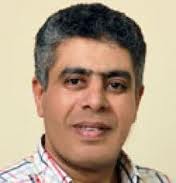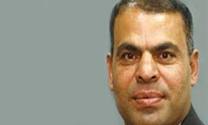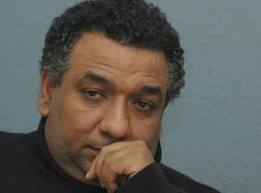One day before a little more than half of Egypt celebrated the newly-elected civilian presidency of Mohamed Morsi, ordinary Egyptians were still carrying the burden of an uncertain future amid an atmosphere of perplexity at how the nation as a collective had reached this point of tension.
Hundreds of thousands converged on Tahrir Square since Saturday night to insist on the victory of Morsi, and a similarly large crowd in Cairo’s Nasr City gathered on the eve of the results announcement seeking to shore up support for Ahmed Shafiq.
As the public awaited the final ‘official’ results to conclude three decades of Hosni Mubarak, Egyptian columnists debated the possible reasons for a delay in the announcement of the results and the introduction of Supreme Council of Armed Forces constitutional decree that many argue will strip the president-elect of his powers.
 Emad Eddin Hussein
Emad Eddin Hussein
Al-Shorouk newspaper
After the Constitutional Court’s ruling that culminated in the dissolving of the entire parliament, Emad Eddin Hussein asks if a coalition of competing political parties had the wherewithal to reinstate the People’s Assembly among the splintering of the prevailing Islamist powers.
In his column, ‘The third alternative,’ Hussein wrote that new parliamentary elections should take place after six months from now, only if the Supreme Council of Armed Forces (SCAF) coax the competing interests of political powers of Egypt.
In case political parties win over SCAF, forcing it to restore the parliament as it once was, new parliamentary elections will have to take place in accordance with the constitutional decree.
Envisioning fresh competition in Egypt’s new parliamentary elections, the writer questions the ability of other political parties to flourish in the coming parliament.
For almost six months, the People’s Assembly was depicted by pundits as being a tool of the Muslim Brotherhood’s (MB) Freedom and Justice Party (FJP) and the Salafist Al-Nour Party, which both enjoyed a lion’s share of the legislative body.
Hussein asks, after the disbanding of the parliament, what plans do the socialist and liberal parties have to capture seats? Egypt’s parliament is a body that merits more than a Brotherhood-Salafist dominance, Hussein wrote.
Hussein scrutinises and chides the three prospective factions with the ability to counter the Islamist dominance in the political scene.
The writer regards the voting bloc behind the socialist ex-candidate, Hamdeen Sabahy, as a power constituting a fifth of the political community.
Potentially, this portion of the voting public is capable of planting the first seed of strong socialist political opposition to the Islamist majority.
Taking into account, the supporters of the moderate Islamist ex-candidate Abdel Moneim Aboul Fotouh, Hussein describes them as another potentially effective power that can side with both revolutionary secularists and moderate Islamists.
As for Al- Dostour political party, the brain child of Nobel laureate Mohamed El-Baradei, Hussein believes it’s the locus for all loose-knit liberal factions.
With the rapidly changing scenarios in Egypt’s political sphere, Hussein advises all political lobbies to commence in drafting plans for the next parliamentary elections.
He concludes his article stressing that ‘the third alternative’ is the only divergence of another parliament occupied by Islamists and old regime remnants.
 Mohamed Amin
Mohamed Amin
Al-Masry Al-Youm newspaper
During the tense period before the official announcement of the presidential election results, the atmosphere in Egypt was replete with rumours and certainties of an impending war between the competing factions.
In his column ‘Announcing results, announcing war,’ Mohamed Amin envisions the announcement as a ‘declaration of war’ between the embattled political fronts.
Irrespective of the winner, the writer connects the survival of the current government to the elected president.
Under a theoretical Ahmed Shafiq presidency, Kamal El-Ganzoury’s government would breathe a sigh of relief, whereas under a Mohamed Morsi government, the same government would ultimately resign.
Legally, the standing government would stand down after the electing of a president or as the writer describes a ‘political resignation.’
Even before the announcement of election results, Amin recalled the fears of businessmen and investors who reportedly fled the country out of fear of Morsi’s claimed victory.
The stock market went up only after indications that the Islamist candidate won the elections. A plague of rumours struck the country, pitting ordinary Egyptians against one another.
For all the negative consequences of this presidential election and its results, declaring the winner of presidency was similar to a declaration of war.
 Wael Abdel Fatah
Wael Abdel Fatah
Al-Tahrir newspaper
Denouncing the Presidential Election Commission’s delay in issuing the election results, Wael Abdel Fatah took aim at the commission’s slow pace delivering official results.
In his column ‘The result,’ the writer regards that the committee’s delayed announcement as a technique to manipulate the nation’s will.
Abdel Fatah notes that, in actuality, the commission makes up the destiny of power in Egypt rather the true power base found in the ballot box.
The committee is regarded as a body that aims at achieving the ‘supreme state interests’, a phrase that has always kept Egyptian’s mouths sealed and has turned the revolutionary will stagnant.
Despite, the committee’s delay in announcing the election results, the writer asserts that secret deals are being secured in a culture of closed doors.
The writer claims the military junta agrees with the Muslim Brotherhood that Egyptians are not mature enough to pave their own road or choose the best ruler.
However, Abdel Fatah argues that the current brotherhood-SCAF relationship can now be longer sustained in the current political environment.
In the second round of elections, the brotherhood have coloured their political discourse, where as the military institution have tightened the constitution with their latest addendum to the constitutional declaration.
None of the parties was courageous enough to display a clear and solid political discourse.
Every faction has tried to come up to the public in a revolutionary colorful outfit.
The transitional phase has neither seen the ability of SCAF to shelter Mubarak and his regime members from scorn and ‘justice,’ and similarly the brotherhood has been unable to similarly transform the state into an Islamist theocracy, Abdel Fatah notes. Both factions are now consumed with series of tough negotiations on who will lead the path in the coming transitional phase.
 Farida Al-Shubashi
Farida Al-Shubashi
Al-Watan News
In her column ‘The coming president and the blood of martyrs’, Farida Al-Shubashi addresses the issue of compensating the families of the 2011 Revolution martyrs.
But just how much valuable is the spilled blood of those who sacrificed themselves for the revolution? While some talk about thousands of Egyptian Pounds, others propose double and triple of such amounts, causing religious clerics to issue fatwas on reparations to be paid by the killers to the martyrs’ families.
Al-Shubashi unequivocally rejects this monetary framing of the martyrs’ issue, and criticises those suggesting that the more the compensation, the easier it is to buy a family’s grief.
This materialistic viewpoint undermines the core meaning of sacrificing oneself; an unmatched type of sacrifice in terms of nobleness.
The author envisions martyrs on couches in heaven, anxious, discontent, and even alarmed, to see such numerically generous offers being hailed by politicians, religious zealots, and intelligentsia.
In an attempt to interpret the reason behind reducing the martyrs issue to a mere financial reparation, Al-Shubashi found some roots extending back to the era of the ‘Open Doors’ economic policy initiated by the former president Anwar El-Sadat in the 1970s.
She quotes the deceased writer Ahmed Bahaa-Eddin describing the ‘Open Doors’ policy as one of ‘deregulation,’ in which the language of money rises to the surface to overtake the debate.
What is even more distressing is the absence of voices advocating the true value of a martyr’s blood.
Al-Shubashi directs her speech to the forthcoming president, stating that the only price that can satisfy the nation’s martyrs is to see the nation enjoying what they had paid their lives for; a free and developed homeland, with true social justice and equality between all citizens.

